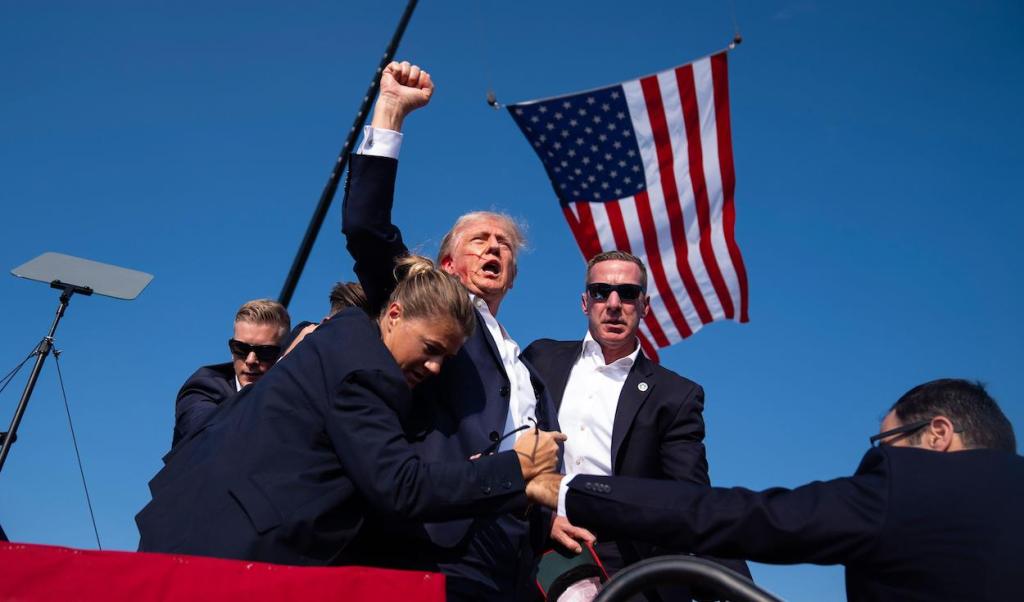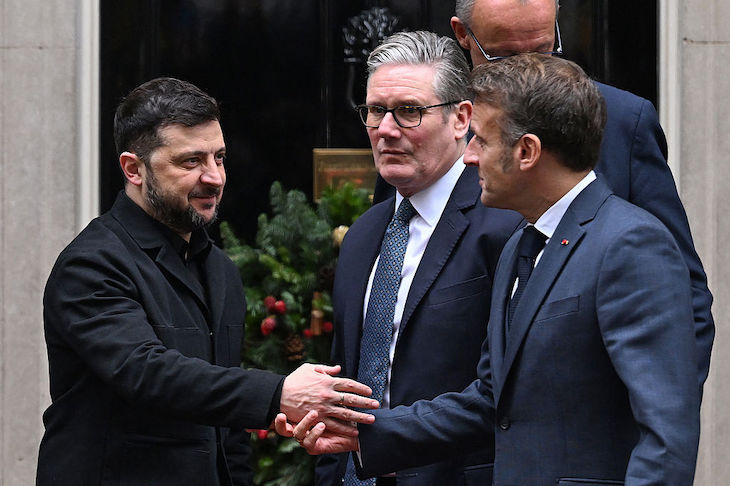That image of Donald Trump, blood streaming down his face, fist raised in front of the banner of the republic, will be a defining photo of the 21st century. Someone attempted to kill the former and would-be president, they missed, and Trump survived. His response to his followers? ‘Fight’. We can expect to see him on stage at the Republican National Convention next week in Milwaukee, a bullet wound to his right ear clearly visible. How might America respond?
The man who shot Reagan was obsessed with the actress Jodie Foster and the Robert De Nero film Taxi Driver
There have been four successful assassinations of United States presidents – Abraham Lincoln, James Garfield, William McKinley and John F. Kennedy – and numerous attempted killings, of which last night’s can be added to the grim list. After the attempted assassination of Ronald Reagan in 1981, his poll ratings jumped from 59 per cent to 70 per cent. The Washington Post reported two days after the shooting, ‘The burst of gunfire that injured Reagan sparked an instantaneous and sharp rise in his popular standing with the American people.’ Reagan was still early on in his presidency, with the shooting taking place 69 days after his inauguration.
The then-president responded to the attack by telling his wife ‘Honey, I forgot to duck.’ Americans warmed to that folksy reply. Much like Joe Biden today, there were claims that the newly elected president was losing his mind. A journalist in the Baltimore Sun wrote shortly afterwards, ‘It would be hard for opponents to make a case of senility against a candidate who stands out in the voters’ recent memory as a man able to smile and wisecrack his way into and out of emergency surgery and a close shave with death.’ He added, ‘No strategist would plan it this way. But both today’s politicians and yesterday’s history books indicate the attempted assassination of President Reagan will help more than hurt his broad legislative program.’

Will the attempted assassination on Donald Trump help his third presidential bid? It’s too early for polling to take into account the attack, but Trump was already leading over Biden. The incumbent’s support has waned in recent weeks as worries grow over his mental fitness. Voters support Trump by 49 per cent to Biden’s 41 per cent. The attempted assassination plays into a core message of the Trump campaign, that the former president is being targeted, that he is a martyr of the political system. In that way, this attempted assassination may end up looking more like the one on Andrew Jackson than Reagan’s. In 1835, an unemployed house painter from England tried to shoot two pistols at the sitting president, both of which misfired. Jackson attacked the man with his cane, who was later found not guilty by reason of insanity.
‘Before two hours were over, the name of almost every eminent politician was mixed up with that of the poor maniac who caused the uproar,’ wrote Harriet Martineau, a British social theorist who was travelling the States at the time. She also wrote that Jackson, ‘protested, in the presence of many strangers, that there was no insanity in the case. He protested that there was a plot, and that the man was a tool.’ On the 180th anniversary of the attack, Time magazine stated that: ‘Although Jackson believed the assassination attempt was the result of a Whig conspiracy against him, (the attacker) turned out to be a mentally ill man, acting alone.’
Madness has characterised many would-be assassins. The man who shot Reagan was obsessed with the actress Jodie Foster and the Robert De Nero film Taxi Driver. In 1881, psychiatrist Edward Charles Spitzka testified on behalf of Charles Julius Guiteau, the killer of President James Garfield. Spitzka was the only doctor to inspect Guiteau and found him to be a ‘morbid egoist’ who believed world events were intricately connected to his own life. The psychiatrist was sure that the killer’s behaviour was the result of ‘a congenital malformation of the brain’. Guiteau was hanged in DC, two days before the anniversary of Garfield’s assassination.
Spitzka son, another Edward Spitzka, conducted the autopsy on Leon Czolgosz, who was electrocuted in 1901 for killing President William McKinley. His brain was found to be typical, with no abnormalities. Instead, he was motivated by political anarchism and the assassination of King Umberto I of Italy the year before. Czolgosz said afterward, ‘I killed the president because he was the enemy of the good people – the good working people. I am not sorry for my crime.’ Anarchism is now mostly consigned to history, a result of public disgust at such acts of political violence. In Teddy Roosevelt’s address to Congress on taking over the presidency from McKinley, he said, ‘of the last seven elected presidents, he is the third who has been murdered, and the bare recital of this fact is sufficient to justify grave alarm among all loyal American citizens.’
Will American fury abate after this latest attempt on a president’s life? A survey conducted at the end of last month by the University of Chicago found an entrenched attachment to violence on both sides of the aisle. One in ten Americans, 26 million people, support violence against Trump, while 7 per cent, or 18 million people, support violence in favour of Trump. According to a recent Chatham House report, ‘Half (54 per cent) of self-described strong Republicans in America now think it is very or somewhat likely there will be a US civil war within the next decade. Four in ten (40 per cent) strong Democrats agree.’ Such figures, to quote Roosevelt, are sufficient to justify grave alarm among all loyal American citizens.
Watch more on Spectator TV:









Comments